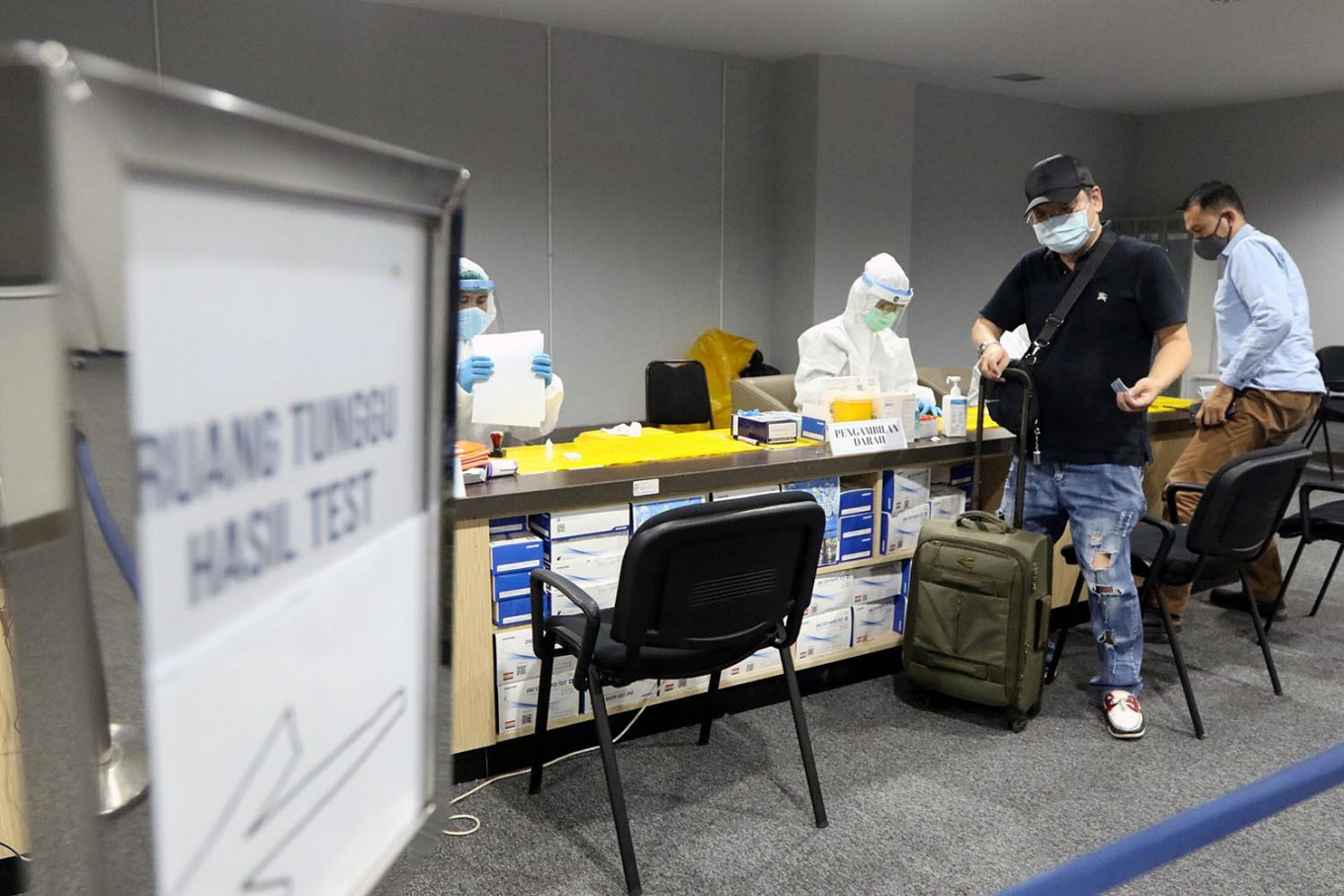Popular Reads
Top Results
Can't find what you're looking for?
View all search resultsPopular Reads
Top Results
Can't find what you're looking for?
View all search resultsIndonesian travelers enjoy convenience of COVID-19 testing at airports
Airports in Indonesia offer only COVID-19 rapid tests rather than the more reliable PCR test, even though some require PCR test results before passengers may board planes.
Change text size
Gift Premium Articles
to Anyone
E
ver since the WHO declared COVID-19 a pandemic on March 11, air travel has been considered a risky business and is among the travel activities that have significantly changed in terms of procedures and regulations to curb the spread of the coronavirus.
Over the past few months, rapid or Polymerase Chain Reaction (PCR) test stations have been a common sight at airports around the globe to help travelers get tested just before their flight as part of the new health protocol. All passengers, including in Indonesia, are now required to obtain a test result before they get on the plane showing that they are either coronavirus-negative or, in the case of the rapid test, nonreactive.
Read also: COVID-19: Here are the requirements for those seeking to travel to, within Indonesia
Nolly Artha, 28, an employee at a private company, took a rapid test at Halim Perdanakusuma Airport in East Jakarta prior to her flight to Malang, East Java, in July.
“It's more convenient [to take the test at the airport] than going to a hospital, because I was afraid of being exposed to sick people,” she recently told The Jakarta Post. “It's also cheaper and not as crowded as taking the test at the hospital.”
As the test result is valid for 14 days, she did not take another test prior to her flight back from Malang to Jakarta two days later.
“In Malang I didn't see many people; I only spent my days at home and did some errands at the bank twice,” she said.
A private-sector employee living in BSD, South Tangerang, Aditya Nugroho, 30, said he felt safer taking one rapid test prior to each flight, even though he flew several times within 14 days.
“For work, I went to Pangkal Pinang [in Bangka Belitung Islands] through CGK [Soekarno-Hatta International Airport in Tangerang, Banten], and then to Palembang, South Sumatra, also through CGK,” he said. “Before going to Bangka, I took a rapid test at the Skytrain Station of Terminal 2 provided by Kimia Farma Lab. Then, before going to Palembang, I took another rapid test at Terminal 3 Ultimate, also from Kimia Farma Lab.”
Soekarno-Hatta airport also hosts drive-thru rapid test stations at the Soewarna Business Park, including those provided by low-cost airline AirAsia and ticketing app Traveloka.
Aditya said he had doubts about the effectiveness of the rapid test result, which was valid for 14 days.
“It's still very risky, because the accuracy of a rapid test is very low. I think the government should perhaps make the rapid test result only valid for one trip,” he added.
Experts indeed have voiced concerns over the widespread use of rapid antibody tests for COVID-19 as requirements for various activities during the pandemic, including for traveling in Indonesia. According to the Association of Indonesia's Clinical Pathology and Laboratory Medicine specialists (PDS PatKLIn), many of the rapid antibody test brands used in the country had sensitivity and specificity lower than 50 percent.
Just before her flight to Istanbul, Turkey, in July, Mia Kusumawati, 42, an entrepreneur living in Depok, West Java, took a drive-thru rapid test at Soewarna Business Park at Soekarno-Hatta Airport.
“I paid for the test, got my receipt, and then got in the car line to the booth,” she recently told the Post by text message.
Mia said the service was very helpful and she only needed to wait 30 minutes before her test result was issued. Provided by a private lab, the service costs her Rp 150,000 (US$10.25).
Mia showed her test result to the check in staff at the Turkish Airlines booth, the airline with which she flew to Istanbul.
After spending around two weeks in Turkey, she flew back to Jakarta through Istanbul’s airport, where she took the PCR test, also known as a swab test.
“The airport in Istanbul provides a PCR test facility. As a foreigner, I paid 220 Turkish lira (US$30). Turkish people only pay 110 lira,” she said. The test result is emailed to the passenger within two hours. Travelers can also ask for a hard copy of the result.
“[Sadly] we haven’t got any PCR test [stations] at [our] airports,” she said.
According to tempo.co, there are some airports in the country that only require passengers to show negative rapid test results prior to boarding, such as Soekarno-Hatta International Airport and Yogyakarta International Airport. However, there are also airports that require travelers to take a PCR test, such as Ngurah Rai International Airport in Bali and Lombok International Airport in West Nusa Tenggara.
"The requirements depend on the policy issued by each regional administration," said the Transportation Ministry's air transportation director general, Novie Riyanto. (kes)







